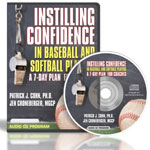Do You Have to Perform Well to Feel Confident?
One of sport’s biggest conundrums is which comes first: confidence or good performance?
Athletes and coaches of all sports believe confidence to be the single most important mental skill for athletes to perform at their peak.
Despite athletes identifying confidence as a key ingredient to performance, they often identify successful performances as the source of increased confidence.
It’s the age-old question: which comes first, the chicken or the egg?
San Diego Padres closer Huston Street is right in the middle of the confidence/performance question.
Street, a nine-year MLB veteran, has not allowed a run since June 23rd and has a 2.82 ERA this season. Street started his 2013 campaign slowly with his ERA ballooning to 4.43 in 20 1/3 innings before being placed on the disabled list in late May with a strained calf muscle.
His struggles continued after being activated from the disabled list in June, allowing four runs and three homers over seven innings that month. Since June 26th, Street has been one of MLB’s most productive pitchers posting a 18/4 K/BB ratio over 17 1/3 innings while only allowing 6 hits. Street is 25-for-26 in save conversions this year.
When questioned about Huston Street’s turnaround, Bud Black, manager of the Padres, stated, “He is trusting his stuff and when your stuff is better, your confidence goes up.” Black continued, “When you’re going well and your confidence soars, you attack. When it’s the other way around, pitchers have a tendency to be a little defensive.” Black espoused the value of confidence by saying, “When any player is playing with confidence, that’s a great mental edge.”
So, does confidence affect performance or does performance affect confidence?
The answer is “they affect each other.”
Confidence and performance have a cyclical relationship.
Confidence is the degree to which you believe in your ability to perform well. Past performances either raise or lower your confidence for future success. Athletes only risk what we believe we can achieve.
Given that confidence can help you perform better, it only makes sense that ball players do everything they can to bring confidence to every game.
When you are playing well, it is easy to feel confident. The challenge is how you respond in adversity (injuries, slumps, mistakes, or bad games).
Top players understand that, throughout the season, there will be ups and downs. They maintain their confidence by working hard and knowing their performance will come around eventually.
Top ball players continue taking risks and seek out ways to return to their previous level of play.
How to return to being a confident player:
- Understand all athletes have bad performances and it’s how you respond that affects future success.
- Focus on what you are doing well. Don’t be self-critical of your performance after games. Recall your past successes and how you worked to get there.
- See yourself succeeding. Images have a powerful impact on an athlete’s confidence.
- Prepare diligently and continue taking the risks necessary to succeed.
Related Sports Psychology Articles
- Boost Confidence via Preparation – De La Cruz
- Be the Driver of Your Confidence
- How to Build Steadfast Self-Confidence as a Ball Player
*Subscribe to The Sports Psychology Podcast on iTunes
*Subscribe to The Sports Psychology Podcast on Spotify
Instilling Confidence in Baseball And Softball Players
Confidence, more than any other mental game attribute, is vital for your team’s success. If your players have it and know how to keep it, they maximize their success. Your team cannot reach their full potential unless each player can harness the power of stable and enduring self-confidence–so your team can perform as a confident team.
Your players might possess a ton of physical talent, have great coaching, and train harder or practice more than anyone else in your league, but if they do not have the self-confidence to match, your team can’t utilize this talent.
“Instilling Confidence in Baseball and Softball Players” program consists of one 72-minute audio CD that includes 7 days of confidence-fueling exercises. You’ll also receive a simple-to-follow 74-page coaches’ manual that guides you through the 7 team session you’ll conduct!



Leave a Reply